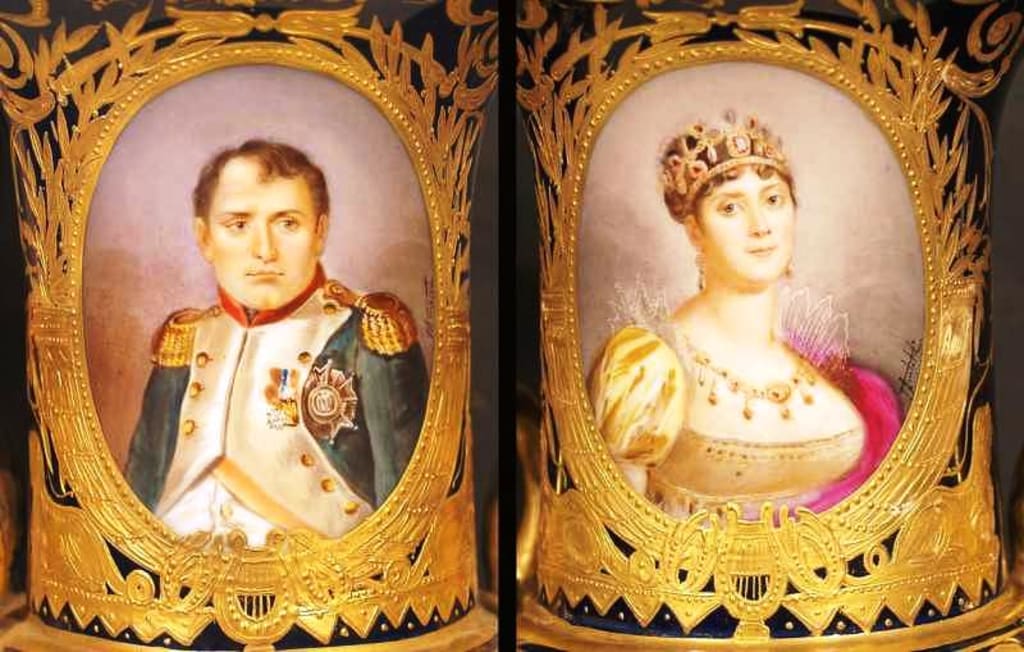The Marriage and Divorce of Napoleon and Josephine
A passionate affair that fell victim to dynastic ambition

On 9th March 1796 Napoleon Bonaparte, rapidly rising through the ranks of the French military, married Josephine Tascher de la Pagerie in a civil ceremony. She was six years older than him and had been married before to a victim of the guillotine, but had retained his name of de Beauharnais. She had also been imprisoned for a time so was perhaps fortunate to have survived.
The couple were clearly deeply attracted to each other. Josephine exuded an erotic charm that the red-blooded young Corsican general, then aged 26, could not resist, and the affair would appear to have been a passionate one, at least at first. The letters that have survived between the couple bear witness to a very physical relationship.
Marriage
Napoleon was very conscious of the age disparity between them. However, they got round the difficulty, and stopped tongues wagging, by lying about their ages. Josephine trimmed three years off her age and Napoleon increased his by two, by the simple expedient of borrowing his brother’s birth certificate for the occasion of the wedding. Presumably nobody needed proof for Josephine’s claim – if she said she was 29 she was 29 and that was the end of it!
It has long been common practice in France for weddings to be in two parts, with the legally necessary civil ceremony followed by one blessed by the Church. However, Josephine had to wait a long time to walk up the aisle – it happened only in December 1804, on the day before Napoleon was due to be crowned Emperor by the Pope.
During the early days the marriage was clearly a happy one, to judge by the letters that have survived. A month after the wedding, Napoleon wrote to Josephine urging her to join him in Milan:
“But of course you’re coming. You’ll be here beside me, on my heart, in my arms, on my mouth … a kiss on your heart, and then one a little lower down, much lower down.”
Straying from the marital path
The nature of Napoleon’s career in charge of the armies of the Revolutionary government took him far from home. It was during his campaign in Egypt that Josephine was tempted by the attentions of another army officer and began a steamy affair with him. This nearly brought about a divorce, but a solution was cobbled together, with Josephine persuading Napoleon to forgive her indiscretions. However, this was only a temporary expedient.
As is often the case in such matters, the blame was not only on one side. It was Josephine’s affair that caused the rift, but Napoleon had not been innocent in this regard either. Being male, and the most powerful man in France, meant that his affairs were of far less importance than those of his wife!
Divorce
The marriage only lasted until 1810. Not only was marital infidelity a cause of the marriage breaking down, but Napoleon’s main concern was that Josephine had produced no sons, although she had two daughters from her previous marriage. As she was now aged 46 the production of a new son and heir was going to be an unlikely event. Divorce was therefore inevitable.
Napoleon’s divorce of Josephine was not done with much kindness. On 15th December 1809 he said to her: “I love you still, but in politics there is no heart, only head”. It was a long way from the salacious tone of the love-letters he had written to her previously. It was reported that Josephine fainted on hearing the news.
After the divorce papers were signed, Josephine fled from the palace in tears, soon to be replaced by the woman that Napoleon had ready and waiting in the wings, namely 18-year old Princess Marie Louise of Austria.
Josephine lived out her days in lavish retirement at Malmaison, just outside Paris. She died five years later - a month before her 51st birthday - after Napoleon had also fallen from power and was being held in exile on the island of Elba.
About the Creator
John Welford
I am a retired librarian, having spent most of my career in academic and industrial libraries.
I write on a number of subjects and also write stories as a member of the "Hinckley Scribblers".






Comments
There are no comments for this story
Be the first to respond and start the conversation.